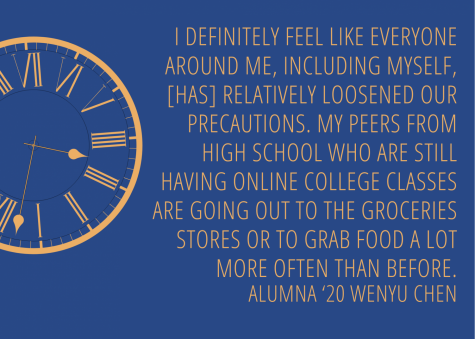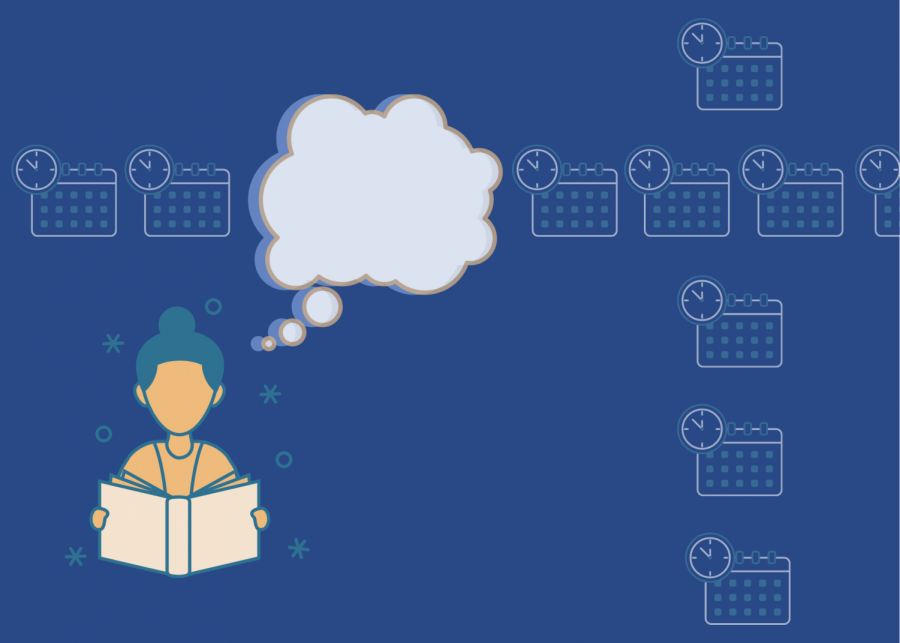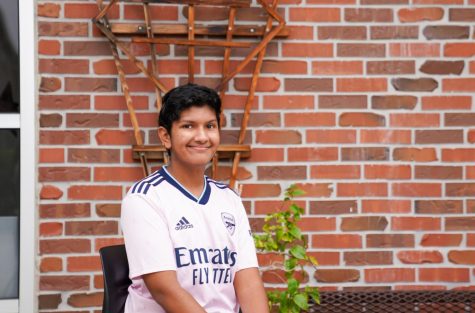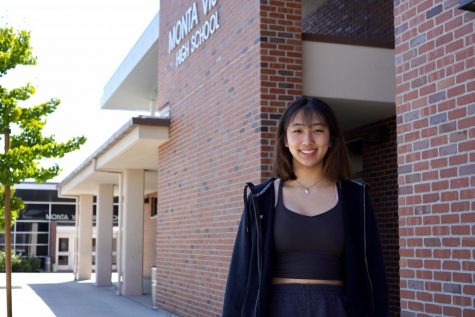A year of reflection
The MVHS community looks back on initial COVID-19 pandemic reactions a year later
The MVHS community looks back on initial COVID-19 pandemic reactions a year later.
March 26, 2021
Last year in March, the World Health Organization (WHO) declared the outbreak of COVID-19 a pandemic, and countries began to impose stay-at-home orders. For many of us, March 13 marked the last day when we were surrounded by teachers and peers in a physical classroom.
Now, more than a year later, it seems like the precautions and changes that resulted from the pandemic are endless. Constantly disinfecting things, wearing masks and living our lives online all seem like the new normal. On the flip side, compared to a year ago, certain aspects have begun to move back to pre-pandemic life — sports are loosening restrictions, hybrid learning is starting and it seems like people around us are recognizing the silver linings of the pandemic.
A story published by El Estoque last year explored how COVID-19 has personally impacted members of the MVHS community, and now that a year has passed, opinions and sentiments have shifted.
Chinese teacher Zoey Liu
Last spring, Liu shared that she embedded information about the virus into her curriculum to help de-stigmatize the topic and help her students embrace Chinese culture. One year later, not only has Liu made changes to some of her curriculum, but she has also decided to focus on social justice issues after noticing that news outlets in both the U.S. and China were critical of the other country’s lack of freedoms and progress in the fight against the virus.
“If I read news from the Chinese sources, it’s always focusing on how horrible things are in the U.S.,” Liu said. “If I read news here, it’s all focused on how horrible things are in China — for example, people don’t have freedom, they get monitored when they go online and things like that. I think that’s a small piece about social justice; we can’t trust everything in the news we’re reading and we’ve got to compare sources.”
Additionally, adapting how she presents her curriculum to her students has helped Liu learn valuable lessons that she can continue to use, even after the pandemic. To overcome challenges that come with distance learning, Liu experimented and tested new tools for her classes, and they have proved effective. One main activity Liu has her Chinese Four students do is watch recorded Edpuzzle lessons asynchronously, giving students the opportunity to learn things at their own pace.
“I probably have more introverted students than extroverted who might not like to express themselves openly,” Liu said. “But when they write their ideas [and] express themselves in Edpuzzle, or in their homework packet, it gives them an opportunity to be creative, and to tell me more about themselves and about what they’re able to do.”
Outside the classroom, Liu has picked up hobbies and activities that she did not have time for last year, such as watching Netflix and playing the ukulele — Liu sometimes plays her ukulele for students’ birthdays on Zoom. However, like many others, certain activities that used to be part of Liu’s life are not as viable.
“My husband and I like to travel whenever we can,” Liu said. “But that has stopped for a year and a half now. I think it’s very inconvenient for him personally because we cannot travel during holidays to visit his family, and [last year was] the first time that he couldn’t see his family during Christmas. Since we have to quarantine [for two weeks before seeing his family], but we only get two weeks off [for our jobs], we [aren’t] able to see his grandparents, so that’s kind of devastating, but everyone understands what needs to be done.”
In last year’s story, Liu also mentioned that her family in Wuhan was safe and healthy, which still holds true. Liu highlights that even though there are no cases in Wuhan currently, people there are still cautious. According to Liu, despite having no mask-wearing policies, people only take their masks off to eat or drink, and “everyone is doing their best to maintain the situation.”
“That is a big difference compared to what happens here in the U.S.,” Liu said. “I was in a meeting where the director from the CDA was answering questions. He said this pandemic definitely helped health organizations to focus on their priorities […] and [helped] people in power to realize that we were not ready for a pandemic to hit us. There’s a lot we need to do. I think the conversation has started, which is a great thing, because not that many people were talking about [how to prepare] before this pandemic, so I think there’s going to be a lot of improvement.”
Alumna Wenyu Chen, ‘20
After returning to the U.S. from celebrating Chinese New Year in China last winter, Chen recognized the social stigma surrounding COVID-19, as well as jokes made about the severity of the virus. Last year, Chen expressed her frustration as she heard people around her laughing about COVID-19-related deaths.
“When I [was interviewed last year for the article], it was during a sensitive time where China was overwhelmed by patients, while everything in the U.S. was still functioning normally,” Chen said. “When I came back from China, I absolutely hated the way people joked about COVID-19 when Chinese people were suffering. At this [time] in the U.S., everyone has definitely had a better understanding of the consequences of COVID-19. The content of the jokes have changed, and I feel like most people around me have changed their attitudes.”
When Chen returned from China last year, self-quarantine regulations were just beginning to be established, and quarantining for the safety of others was her personal choice. Earlier in 2021, when she traveled from her college in the East Coast back home to Cupertino, she also self-quarantined because of changed regulations that heavily advise quarantining for a week after traveling. Though restrictions have tightened compared to last year, Chen noticed that she and her peers have definitely become more lax when it comes to restrictions over time.
“In the beginning, everyone was really strict about [quarantining], [staying] home [and] social distancing,” Chen said. “I definitely feel like everyone around me, including myself, [has] rela tively loosened our precautions. My peers from high school who are still having online college classes are going out to the groceries stores or to grab food a lot more often than before.”
tively loosened our precautions. My peers from high school who are still having online college classes are going out to the groceries stores or to grab food a lot more often than before.”
Furthermore, since stay-at-home and shelter-in-place orders were implemented a year ago, Chen believes that she and her peers have loosened their precautions due to the longevity of the pandemic and people feeling desensitized to reality.
“Precautions definitely need to be taken and restrictions need to be enforced, but in the end, every day that we are living through right now is pretty much the new normal,” Chen said. “I totally understand if some people strictly stay home all the time to minimize their risk of exposure, but for others, they still have to live, whether that’s working, grocery shopping or socializing with social distancing. I personally think staying in a small bubble should be relatively safe.”
Counselor Monique Balentine
As a counselor, Balentine has worked closely with students, and over the past year, she noticed varying student reactions toward the increased severity of COVID-19 in our community. To accommodate challenges from distance learning and the pandemic, Balentine has been working with the other MVHS counselors to create more resources for students.
“As a whole, I think that students have tried their best [this school year], and I can’t say that it’s been easy for anybody,” Balentine said. “But from what I can see, just over the past year, students have gotten used to [distance learning] as much as they can […] As counselors, we’ve definitely [watched] a lot of videos over the past year like on asking for help [and handling] stress during Advisory. I feel like, in some ways, we’ve been able to do more, but it’s also been a lot of learning.”
Balentine also believes that this pandemic serves as a learning experience, and specifically for the younger generation, a chance to learn how to adapt and adjust.
“I’m hoping that [students] all see that it’s necessary to listen to the experts and to try your best,” Balentine said. “It’s hard because this [time] is unlike anything that I’ve ever imagined in my lifetime, and for students who are younger, I can’t imagine how confusing this time would be. Maybe as elementary school-age students get older, they’ll start to really learn how it really has shaped the way we do things. I was talking to the other counselors earlier, and we were talking about when you watch TV or movies, you see all these people in a large setting and how quickly we’ve had to shift and adapt to a new way of life. It’s remarkable how things have changed so rapidly.”
Similar to Liu, Balentine hopes that this pandemic will help the U.S. better prepare for future pandemics and crises. According to Balentine, a huge step would be to start being more community-oriented as opposed to individualistic.
“From what I’ve learned about pandemics, the same habits and issues happened during the Spanish flu,” Balentine said. “So I think it depends on your generation, and my generation, making sure that together, we learned from this and we actually band together if there is a future pandemic. But I would hope that we will learn from this because it’s such a time of change, and hopefully, we can use that to change for the better.”


















